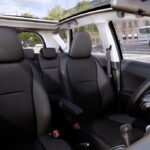BMW E30: Maintenance Costs (Calculation)
The BMW E30 was produced from 1982-1994 in Munich and is possibly one of the most iconic BMW’s to ever be produced. This slick euro came in a 2 or 4-door sedan, 2-door convertible, and a 5-door wagon, my personal favorite.
It’s really hard to say exactly how much you will pay a year, but I will give you some ideas on how much it may be.
How Expensive is Yearly BMW E30 Maintenance?
While these cars are auto icons, they can be pricey to drive over time, most have them as hobby cars. The intention of this article is to shed some light on the maintenance costs of owning a BMW E30.
These cars spanned 6 generations, but most had an S14 inline 4-cylinder engine.
Getting your hands on parts for an E30 isn’t terribly difficult, as there is a massive aftermarket accessory and parts network for these cars. If you are handy or mechanically inclined, that’s even better. When it comes to cars like BMWs, VWs, or Audis, mechanic costs may eat you alive.
Aftermarket parts for an E30 can be cheaper than older factory OEM parts, but they are both pretty expensive.
The biggest thing you need to know is that some motorheads will say these cars are money pits and that you should avoid them.
All cars have problems, all cars break, all cars need maintenance, and so far, no car fixes themselves.
I will try my best to guide you through what is recommended by BMW and even some avid BMW fans.
Realistically on average, you can expect your E30 to run you between $1000 to $2000 dollars a year. Every 30,000 miles you should also plan to have your engine and fluids completely checked and replaced.
Also read: Are BMWs Reliable After 100k Miles? (Checked)
Changing Tires
Tire longevity depends on the brand you use. The more economy tire may not last as long as a tire like a Pirelli or something like that. Tires are one of the most expensive headaches you can have while owning a car.
Where shops get you is the mounting and balancing, most people do not have the option to do this themselves.
If you really love your E30, you are putting the best tires on it, and a set of four can run anywhere from $300-$1000 each. You can also expect to pay a mount and balance fee for each tire, plus the mechanics time.
Thankfully, this only needs to be done every 3-5 years depending on the brand of tire and miles driven. Of course, some of us blow through tires way quicker than others.
Oils and Oil Filters
Changing your oil and oil filters is something that definitely needs to be a habit. For me, I religiously change my oil in any car I have owned. The better you take care of an engine, the longer it will last without any massive repairs.
In the United States, BMW recommends Castrol 5W-30 synthetic motor oil, except for M cars. You should keep an eye on your engine performance and change the oil about every 3,000-5,000 miles.
Some recommend 10,000 miles, but I think that is way too long. If you use BMW’s oil, you can get away with an oil change/ filter change between 5,000-7,500.
Doing it yourself, the filter can go for about $7 but a complete oil change kit including oil can run about $60 depending on the oil, and this is every change.
Also read: Is BMW E92 Reliable? (All You Need to Know)
Fluids
Engine coolant should be changed every two years. The later models can be stretched to four years, but I like to play it on the safe side. Your average gallon of BMW coolant can range anywhere from $25 to $30.
Power steering fluid is always smart to replace every 30,000 miles, that goes for most cars, not exclusively to an E30. Power steering fluid for these older BMWs can be a little pricey at $17-$18 a liter.
Power steering fluid is smart to check or replace every 30,000 miles, but you want to keep an eye on it every 10,000, some engines eat more than others.
Trending Video: How to Easily Bring Back to Life any Old Car Battery and Save Tons of Money (click to watch)
Manual gearbox oil should be, you guessed it, every 30,000 miles. Good gearbox oil can run around $60 for certain brands, but store brands can be around $40.
Automatic transmission fluid varies between 15,000 and 60,000 miles depending on the fluids you use. BMW claims theirs is the best and can last 60,000 miles. Good ATF kits can run around $180, but just the oil can be around $65.
Differential oil should also be changed every 30,000 miles. Some swear by Liquid Molly, even in the States, and two bottles can run about $50.
Be prepared to have a full in-depth inspection of your engine every 30,000 miles and keep an eye on all the fluids.
Belts and Hoses
Water and fuel hoses should be changed every 150,000 miles, depending on how hard you are on your engine maybe bump it down to 100,000-125,000 miles. Depending on the fuel hoses, prices can be anywhere from $15-$30 just in parts. Water hoses usually come in kits, and they can run over $200 depending on the kit.
Depending on your belts quality, you want to replace the serpentine belt on your E30 every 60,000 miles for high-grade belts, but always keep an eye on your belts if there is any sign of deterioration. Lower grade belts, like name brand auto store belts, every 15,000 miles. Belt kits can be pricey, but worth it, typically they can run between $28 for just the belt and $150 for a complete kit.
Brakes
When it comes to brakes on an E30, you should inspect your brakes every 10,000 miles like most cars. Brakes are actually one of the easiest things to replace on an E30 comparatively.
Brake fluid itself should be changed once a year regardless. Pads themselves can last between 30,000-70,000 miles depending on the brand and type of brake. The biggest factor in your brakes lifespan is your driving habits.
It’s always cheaper to do brake jobs yourself, as a typical brake job can range from $200-$500 per sets of two. Again, it’s easier and cheaper to do brakes yourself, but it depends on how much your time is worth to you.
Also read: BMW E90: Maintenance Costs (Calculation)
Unexpected Problems
Some E30’s have been known to have some sub-frame bushing problems; it is recommended to keep an eye on them.
This car is not immune to rust in any sense of the word, the floor wells, in particular, can become particularly rusty.
Dirty wiring is a problem with these older BMWs as well. Fuel pumps for E30s can be expensive, so it’s a good idea to routinely clean your wiring harnesses.
Overheating in the engine bay can happen with older cars, but in the E30 especially the allow heads can warp. The overheating can sometimes be an older radiator, so start there with any temperature problems.
Owning any car, regardless of age, you should have money set aside for unexpected car trouble. New and old cars have problems, some are just more reliable, of course. Most who own an E30 don’t typically daily drive them though, so a few weeks in the garage is no problem.
Also read: BMW E46 Maintenance Costs (Calculation)
Insurance
Insurance can vary from state to state, region to region, and country to country. Its nearly impossible to say how much insurance will cost an individual.
If you live in a city, you are more prone to risk, so expect if you live in a major city to pay more than the guy who lives out in the country.
One of the biggest factors on your insurance is your driving record.
Contact your local broker if you have any questions or want quotes, but I cannot recommend a particular person or company for you.
You may be able to go through a vintage car insurance company, but it depends on their underwriting. It is impossible to determine what any individuals rates will be.
Other Maintenance
Other maintenance, the worst part, and it is inevitable. Air filters and interior air filters should be replaced every 15,000-30,000 miles.
The fuel filter is also a big variable, these can be changed about every 30,000-60,000 miles. Bosch, MANN, and Mahle are great ones to go with for satisfactory performance. These can range in price from $9 to $20.
Valve adjustments can every 15,000 to 30,000 miles as well, depending on the engine. The M30 engines can be 60,000.
Sparks plugs should be replaced every 15,000-60,000 miles depending on your brand. The factory spark plugs can, according to BMW, last 100,000 miles. You should check your spark plugs every 60,000 miles for oil leakage regardless. Sets of spark plugs can run anywhere between $70-$100.
How to Buy a Reliable BMW E30?
Buying a reliable E30 is just about the same as any other car you’d consider buying. Of course, E30s are becoming more of a classic car than a commuter car.
Things you want to look for visually besides paint is rust, always check the frames and engine bay for rust.
For example, in the United States cars in the northeast are constantly exposed to road salt and brine, so rust is very common on all cars from that region. Cars in the southern U.S. are not safe either.
If they are not garage kept, the sun eats away at the paint.
Always be careful of cars for sale near any ocean. The sea salt gets into the air and can eat cars from the paint to the metal chassis underneath.
One very important thing to watch for in any car is the cars geographical history, some cars may be flooded out, sold in an auction, and flipped. Checking the title record is a good way of knowing where a car came from.
It goes without saying that you should always see how detailed the owner was in their record-keeping, oil changes, brakes, etc. Professional motorheads keep documentation of everything from lug nut replacements to transmission repairs.
Also read: BMW Z4: Years to Avoid (and Safe Years to Buy)
Conclusion
Owning an E30 can be a fun and rewarding experience, but these cars can be a headache, like most older German cars. There are plenty of euro specialty mechanics out there, but they can run a pretty penny, generally its better to do this work yourself and only pay for parts.
You should genuinely plan to spend about $2,200 give or take per year to keep your E30 happily on the road. On top of that, you have to plan for unexpected repairs and that every 30,000 miles you will need almost all fluids and some belts replaced.
These are small prices to pay for the coolest car BMW has ever made. For best recommendations, check your owner’s manual to see what the factory says for maintenance.






